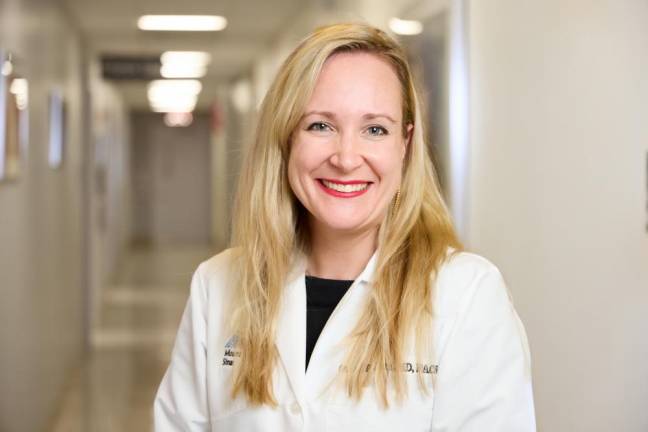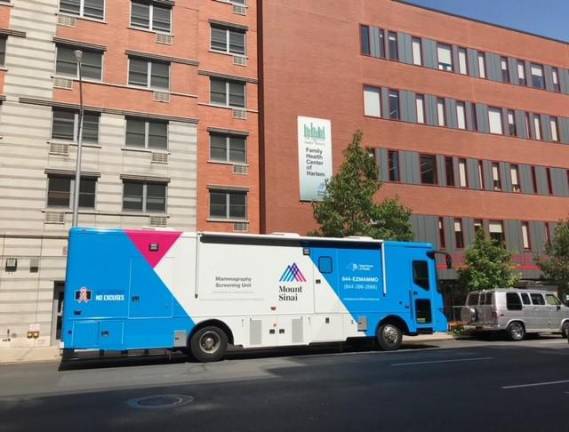‘The Earlier Breast Cancer is Diagnosed, the More Treatable it Is’
For Breast Cancer Awareness Month, a Mount Sinai breast cancer surgeon warns against delaying screening during the pandemic


In the depth of the pandemic last summer, the head of the National Cancer institute warned that delayed screening for breast and colon cancers would lead to 10,000 extra deaths over the next decade.
It is too soon to see if that chilling forecast is bearing true, says a leading breast cancer surgeon, but it is not at all too soon to try to head it off by stepping up cancer screening.
“The best way to diagnose breast cancer is still mammography,” said Dr. Sarah Cate, a surgeon at The Mount Sinai Health System. “The earlier breast cancer is diagnosed, the more treatable it is.”
Three out of four women who develop breast cancer have no family history or other risk factors, which is why annual screening is urged so strongly for all women over 40. Among other services, Mount Sinai offers screening throughout the city at its Mobile Mammography Van, which can be reached at 844-396-2666 (yes, that is 844-EZMAMMO) or by email at mobilemammo@mountsinai.org.
For women who do have family history or other risk factors, Cate leads the Special Surveillance Breast Program at the Mount Sinai Health System. “I run high-risk programs across our eight hospitals,” she explained, “looking at patients that have a genetic mutation for breast cancer, at a higher risk for breast cancer, due to family history or due to a certain types of abnormal biopsies.” She spoke to Our Town about the need for vigilance during the pandemic.
This is a particularly crucial time, isn’t it?
October is Breast Cancer Awareness Month and this October we’re dealing both with COVID and with breast cancer awareness. So, I think it’s important for patients to understand that we’ve always been open for breast cancer screening and for breast surgery. Even during the height of the pandemic, we were still seeing patients even though we couldn’t operate for a period of about five to six weeks. So, we’re doing mammograms. We’re doing mammograms on the weekends. We’re doing mammograms at night.
All health care workers are now vaccinated in New York state. So you will be safe if you come and get a mammogram; you will not get COVID. All of our health care workers are wearing masks and all of the patients are required to wear a mask. But certainly, we want patients to know that we have early morning hours. We have evening hours. We have Saturday hours. If you’re nervous about being around other people, those times may be less populated at our centers. So that’s a good option if you’re feeling some anxiety. But don’t put off your screening, because the best way to diagnose breast cancer is still mammography. The earlier breast cancer is diagnosed, the more treatable it is and the less treatment you might need.
The risk of putting off screening is not theoretical?
We had done a study pre-pandemic looking at screening. Patients that did not get mammograms did much worse with breast cancer. They needed more aggressive surgery. They needed chemotherapy and they were more likely to need mastectomy rather than breast conservation or lumpectomy. So, it’s absolutely of the utmost importance that, especially if you missed a mammogram last year, that you need to come in 2021.
Is deferring a screening out of concern about COVID riskier than getting COVID?
Yes. I would argue that missed screening for breast cancer is more dangerous than COVID. Obviously COVID is of enormous concern and we do need to do everything that we can do to prevent getting COVID. So I would strongly advocate that whoever can get vaccinated needs to get vaccinated, because that’s our only chance of ending COVID. If you get a COVID infection and you’re young and healthy, you’re going to be fine. But if you get breast cancer and you’re young, you may not be fine. If it’s your first [mammogram] don’t put it off because of COVID, because there may be something there that needs to get treatment and you’ll be fine if you get it caught early.
What is your basic guidance?
The important thing for patients to know is that if they feel a lump to get checked out. So often we have patients that are pregnant that say, “Oh, I thought it was a clogged duct. I thought patients that are pregnant can’t get breast cancer. I thought I was breastfeeding, so that reduced the risk of breast cancer.” By the time they get into us, it’s been too late.
So, don’t ever ignore something. It’s no different than having bleeding in between periods. Something like that is abnormal, so you need to talk to your doctor and get checked out. I think it’s very important for pregnant or breastfeeding patients not to take these lumps for granted and to say, “Oh, this is just nothing. This has to be related to pregnancy or breastfeeding,” because we know that patients with pregnancy-associated breast cancer do much worse. So definitely do not ignore any signs or symptoms. No matter what you’re doing or where you are in life, get a neighbor to watch your baby and come on in.
Tell us about treatment if you do discover a cancer.
The majority of breast cancers don’t need chemotherapy. The majority of breast cancers just need pills like Tamoxifen or Anastrozole, which block estrogen and patients do incredibly well. Yes, you will need treatment. Yes, you will need surgery. Yes, you may need chemotherapy. But those things are self-limited and so much has changed in terms of the medications we give to manage chemotherapy side effects.
We have cold capping at Mount Sinai, which means you wear like an ice-packed cap while you’re getting the chemo and it freezes the hair follicles. So it prevents total hair loss.
We have a lot of clinical trials looking at ways to improve survival for more aggressive breast cancers like triple-negative breast cancer. So there’s a lot, a) in the pipeline; b) so much treatment has evolved; and c) don’t be more petrified of the treatment than of the actual cancer. Because the treatment is going to be relatively short in someone that’s going to hopefully live for 85 to 90 years.
If you’re getting a mastectomy you might have a larger cancer or cancer in more than one area, but you’ll get reconstruction on the same day. At least if you come to Mount Sinai. You’ll meet with the plastic surgeon. You’ll talk about different types of reconstruction. We do a lot of autologous reconstruction at Mount Sinai where we take tissue from the belly and do a tummy tuck and bring that tissue up and make new breasts out of it. It’s all covered by insurance, which is national law.
How did you become a cancer surgeon?
I decided to specialize in breast cancer because of mentorship. I worked with a breast surgeon who was then at Columbia and now is at NYU, two breast surgeons actually. They both just had such a warm and wonderful way with patients and really motivated me to be interested in research and combining clinical practice with research as well as showing that you can be kind of like a strong woman in surgery. But also be able to express empathy, and to be able to express emotion, and to be a really great surgeon, and to maintain those parts of you, which in surgery is kind of discouraged in general. I also really like the long term follow-up with patients. Patients that I’ve operated on seven to eight years ago are still coming in and it’s so great to see them and to talk about other things besides their breast cancer, because they’re doing so well.
This interview has been edited and condensed.